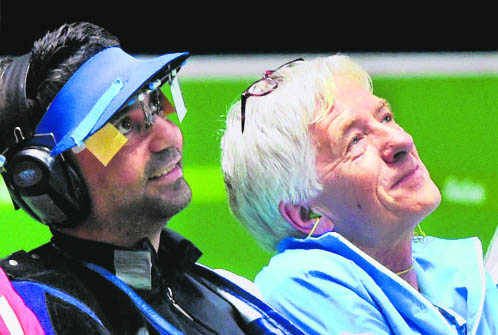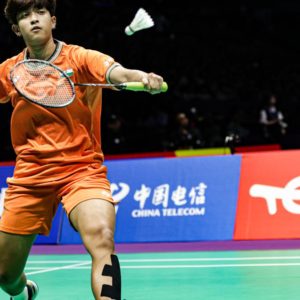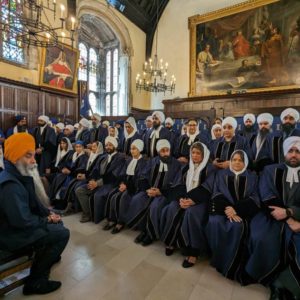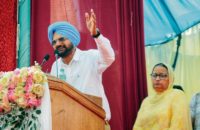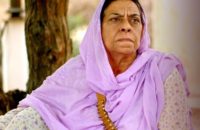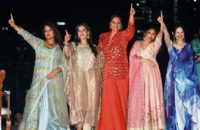Rio de Janeiro, Abhinav Bindra and Rafael Nadal are two of the world’s great sportspersons. They’re champions, they are, and they’ve been, the best in the sport they’ve chosen. We, the observers and fans, we the clueless analysers of their craft, will never ever know what they go through as they seek perfection. We the commoners, who live ordinary and unheralded lives, will never know what it takes to become the best in the world. It’s just not possible for us to understand the depth of their physical and mental power, and the depth of their physical and mental pain, in their obsession to be perfect.
They have their own ways to engage with their fans and inquisitors. Some bizarre stuff is thrown at them. They react differently.
Disappointed?
A few minutes after Bindra has shot the last shot of his professional life, which was good enough for 10 points, but not good enough to win him a medal, the first thing he’s asked is: “Are you disappointed?”
Disappointed? After 20 years of shooting, pain, ecstasy, sorrow, injury, after winning gold in 2008, after giving up and then being unable to give up shooting, moments after missing a medal by a whisker in his last tournament, is he disappointed? Shooting is the essence of his existence for 20 years — is he disappointed at missing a medal by .6 of a point as his shooting life ends?
Bindra’s frown deepens. “Fourth in the world is good. I’m not disappointed,” he says, before rapidly walking away. A little later, he’s asked how it felt to have missed the last shot of his professional life. “I didn’t miss it,” he says of the shot that got him a 10. “I didn’t miss the target.”
Then, to another question, he answers: “This is sport… There are no certainties in it, and if you stay in your profession for a couple of years, you’d realise that!”
Ouch!
The journalist’s intelligence, in Bindra’s view, is clearly not up to Bindra’s own astounding brainpower.
Bindra’s words drip sarcasm, and that’s the way he’s always engaged with the media. That’s how he deals with questions that are not up to the mark — and believe me, they’re rarely up to the mark.
But that’s always been his method, and that’s all right, for he’s a champ, and champs choose the way they engage with the world.
Smile fatigue
Rafael Nadal, soon after winning his match, a tough three-setter, emerges and walks through an aisle formed by people on both sides. It would be wrong to call them people — they’re like man-eating tigers who wish to devour him with their eyes and cameras. They shriek his name, they shout at him, they thrust autograph books at him. Nadal is unfazed — he signs autographs, shakes hands, does high-fives, even poses for selfies, and ruffles a child’s hair, even as security guards try urgently to escort him towards normalcy.
But there’s no normalcy in Nadal’s life. A Spaniard, he strikes a strong chord with the Latin people of Brazil. He strikes a chord, actually, with people all over the world.
He’s taken to small knots of waiting journalists; he stops before each group, and urgent questions are thrown at him. He answers them calmly and patiently. The questions range from the quality of his game to the nature of the tennis crowd in Rio de Janeiro. Some of the questions make little tennis sense. But Nadal is a very civil man, and he answers the questions patiently and respectfully.
Considering his world renown, his mad and passionate fan following, Nadal has managed to remain a remarkably decent fellow.
There is perhaps no one right way for great icons to react to the madness they incite among their fans and watchers and media. Some like Nadal remain lovely, some like Bindra remain avoid-worthy — and that’s equally OK, because genius and great achievers are not bound by convention.
Judoka Silva wins first gold for host country
Brazilians celebrated in the stands after Rafaela Silva won gold in women’s judo on Monday, claiming the first Olympic gold medal for the host country and capping a journey to the podium that began in one of the city’s most notorious slums. Silva raised her arms in triumph as she overcame top seed Sumiya Dorjsuren of Mongolia, following a pulsating semifinals victory that went into extra time against London silver medallist Corina Caprioriu of Romania. Gold for Silva marks a fairytale ascent to the Olympic podium from a childhood in Rio’s Cidade de Deus favela, made famous in the film “City of God.”
Breaking News
 Man gets life imprisonment for murdering teenage Indian wife in London
Man gets life imprisonment for murdering teenage Indian wife in London Raja Warring’s wife Amrita sparks row with Congress’s hand symbol remarks
Raja Warring’s wife Amrita sparks row with Congress’s hand symbol remarks Canada caps foreign students’ working hours beginning fall semester
Canada caps foreign students’ working hours beginning fall semester Raja Warring to contest againt BJP’s Ravneet Bitu from Ludhiana
Raja Warring to contest againt BJP’s Ravneet Bitu from Ludhiana Student protests over Israel-Hamas war roil US campuses ahead of graduations
Student protests over Israel-Hamas war roil US campuses ahead of graduations Russian ex-spy mastered art of ‘sexpionage’ feels being ‘brainwashed’
Russian ex-spy mastered art of ‘sexpionage’ feels being ‘brainwashed’ Uber Cup badminton: India’s young women’s squad beats Canada 4-1
Uber Cup badminton: India’s young women’s squad beats Canada 4-1 Nominees take digital route to strike rapport with voters
Nominees take digital route to strike rapport with voters Indian man jailed in UK for 16 years for attempted murder of ex-girlfriend
Indian man jailed in UK for 16 years for attempted murder of ex-girlfriend 3 Indo-US women killed in US as overspeeding SUV goes airborne, crashes into trees
3 Indo-US women killed in US as overspeeding SUV goes airborne, crashes into trees Indians Immigrate To Canada In Record Numbers
Indians Immigrate To Canada In Record Numbers Punjab CM mocks ‘voiceless’ Sunny Deol, kickstarts Kalsi’s campaign in Gurdaspur
Punjab CM mocks ‘voiceless’ Sunny Deol, kickstarts Kalsi’s campaign in Gurdaspur





